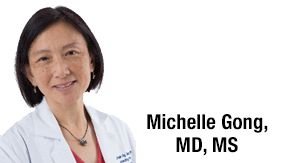Your full title:
Michelle Ng Gong MD, MS
Chief, Division of Critical Care Medicine
Chief, Division of Pulmonary Medicine
Department of Medicine
Montefiore Medical Center
Albert Einstein College of Medicine
Three statements about you – two true, one false.
I am a black belt in Tae Kwon Do.
I once jumped out of a helicopter on a mountain.
I told a division chief during my fellowship interview that I had no ambition to be chief of a division.
Give us your ‘elevator pitch’ biography.
I was a bioengineer in college and was always interested in physiology as well as applying solutions to real world problems. While I was in medical school and looking for research opportunities, my interest in physiology led me to the fields of pulmonary and critical care.
I’ve always been interested not just in providing care at the bedside in the ICU, but also in how to improve outcomes overall, including systems and best practices, as well as what new modalities might work. That led to my interest in clinical trials, my master’s degree in epidemiology, and ultimately a career in research.
Originally, my research started with ARDS, and now involves clinical trials, implementation science and informatics. More recently, I’ve taken on the role as chief, division of Critical Care Medicine and division of Pulmonary Medicine at Montefiore. That role helps me facilitate my interest in building clinical programs, as well as continue my research. This division is unique in that all the ICUs in the system are unified, and fall under the division, thus offering a great deal of opportunity for improving care.
What would you tell yourself as an Early Career Professional?
I would tell myself to be more proactive in seeking collaboration, and in advocating for your ideas. Now, that I’m further into my career, I see people who need the same encouragement.
As an early career professional, especially for women, there’s an issue in believing you may not know enough to say something in the moment, and that maybe these other people have a much better idea, but there is a lot of room for diversity of ideas and different approaches. By not speaking up, you do not contribute to the conversation and the solution. I would have told myself that it’s ok to have a different idea, that ‘different’ doesn’t necessarily mean ‘wrong’ and that in sharing, you have the opportunity to collaborate with smart people to work through and implement your idea.
If you weren’t in medicine, and were in a different industry altogether, what would you be?
I would probably be in engineering systems, solving operational problems, or maybe doing something with some degree of data science and informatics. I find it hard to believe I wouldn’t be in a career in which I’m trying to find answers to problems.
What is your favorite way to spend a day off?
I like to spend the day outdoors, doing something with my family and dog, whether that’s hiking, skiing, rock-climbing – something with the sun on my face, keeping my body active and moving around, and seeing trees and mountains. And then, after a hard day of activity, I like a hot shower and dinner in a nice restaurant!
What areas of medicine are you most excited to see develop?
I’m excited about so many different things that are going on right now. I’m biased, and I’ve always done clinical research so I’m most interested in the development of initiatives to improve patient care and outcomes. I’m also interested in big data advances, and the work toward using big data to help clinicians deliver care, and identify and better target at-risk patients as way to make sure we’re giving care to all the patients who need it most, though there are also pitfalls in that to be aware of, and avoid. Personalized medicine has been done in oncology and hematology, but there are new possibilities in the critical care arena.
What is one advancement in your field you’d like to see in your career?
I look forward to a better integration in terms of hospital operations and research. We’re getting to the stage where big hospital systems are the means through which most patients and clinicians encounter care, but we haven’t seen as much of these large groups collaborating with researchers to systemically understand not only what works and doesn’t for patients, but also what may be most efficient for health care delivery. I would love to see more and more of that developing, large and small scale. Some systems are starting to do that, but I’d like to see it across the board.
Ok. Which statement did you make up?
I am not a black belt in Tae Kwon Do.

